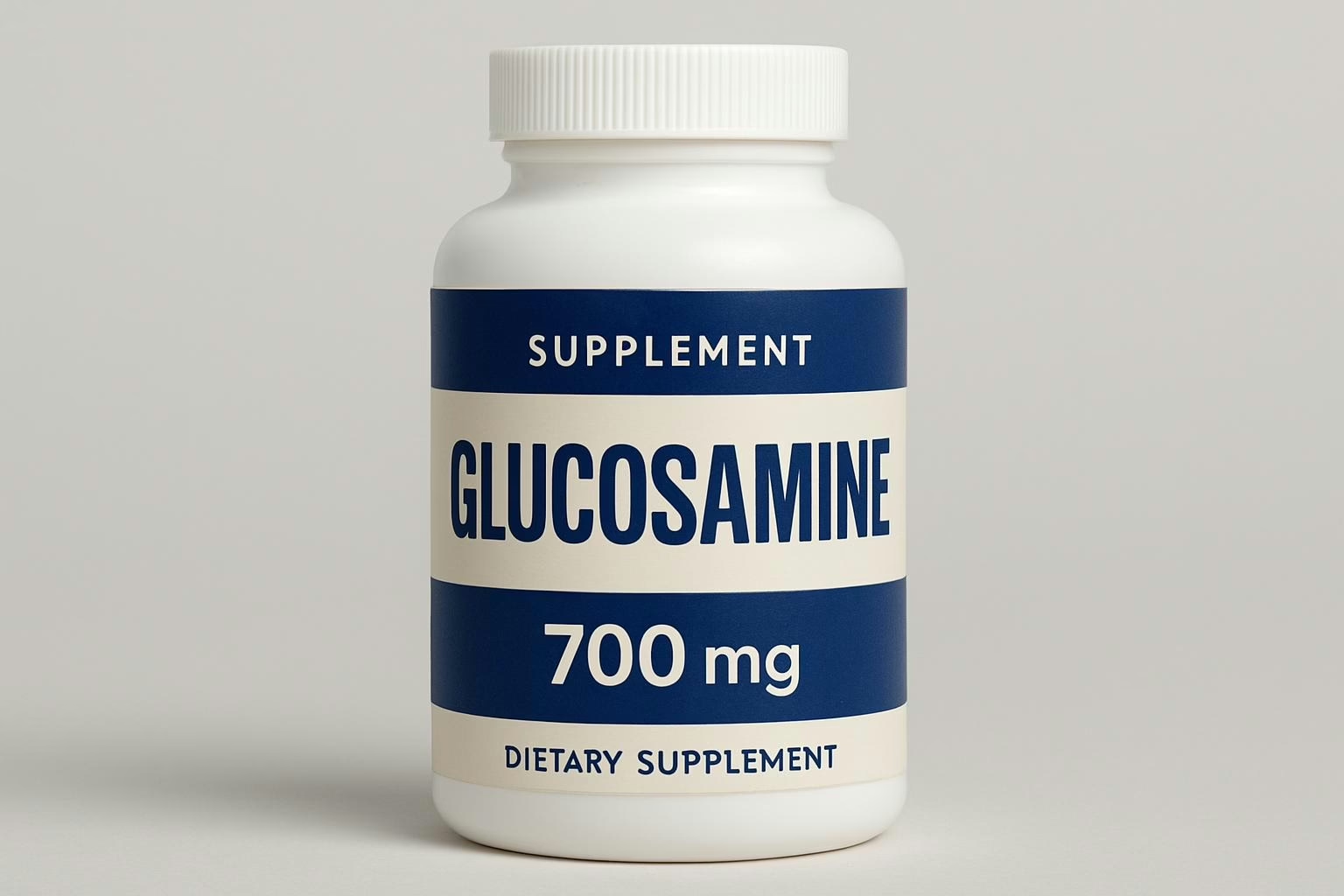
Do Glucosamine Supplements Support Joint Health
Glucosamine supplements are well researched and popular options to support joint health. If you are considering taking glucosamine supplements you may be considering the evidence that supports their use in promoting optimal joint health.
Nutritionists are aware of some important nutrients and foods that may support our joints from clinical studies. These may include collagen and chondroitin. Vitamin C is also thought to be able to have possible supportive influences on joint health. If you wish to read more about various joint health nutrients which are well established then you could do so here.
A lot of nutritional focus on joint health centres around inflammation reduction and overall joint building block support. This is because of the daily wear and tear that our joints experience. They need to recover from damage just as your muscle do after a significant workout.
Currently glucosamine is the most used nutritional supplement in the US and is usually produced from mammalian or marine cartilage. Glucosamine is usually obtained from crustaceans. Most glucosamine supplements come in the form of glucosamine hydrochloride or glucosamine sulfate. N acetyl glucosamine is also popular. This is a very popular supplement in support of osteoarthritis which is a debilitating joint disease.
Here the evidence that glucosamine supplements support joint health will be considered to show how this could possibly nutrient influence our overall wellbeing.

Glucosamine
You may be wondering how glucosamine has an effect within the body. Glucosamine is a natural amino sugar molecule. Our bodies naturally make glucosamine. The most commonly used nutritional supplement in the States just so happens to be glucosamine. This popularity could be because of a combination of factors. One is significant clinical research with glucosamine and also theory that this nutrient is essential in making different joint specific building blocks.
Glucosamine is needed by our bodies to produce important building block molecules that support connective tissue health. This includes glycoproteins and also hyaluronic acid. Glucosamine makes up about 50% of hyaluronic acid. Hyaluronic acid is thought to provide a cushion like effect on joint movement that shields the joint from excessive deterioration.
Other important joint building blocks include chondroitin and keratin sulfate. These help to make cartilage tissue. They are both implicated in cell adhesion and interact with important intra cellular components such as collagen or fibronectin. Research shows that these compounds may also help our joints to maintain resistance to high shear stress and compression. Resistance to external force is a very important factor in maintaining exercise function and ability.
Glucosamine is an essential component in the production of both of these joint tissue building blocks. This emphasises the importance of sufficient glucosamine in maintaining optimal joint health.
Current research also indicates that glucosamine could also have an anti inflammatory influence in addition to providing support in producing these essential joint building blocks. Glucosamine may do this through influencing the release of inflammatory cytokines which aggravate inflammation. Heightened amounts of inflammation in the joints are of course detrimental in maintaining joint health. This may also lead to the development of inflammatory joint diseases which will naturally reduce athletic capacity and ability.

Does Glucosamine Really Help Our Joints
Theory is one thing. Practically showing links from supplement studies is another thing entirely.
Glucosamine supplements have a well established safety profile. There is also a low incidence of any side effects with glucosamine supplementation. In addition glucosamine supplements are the number one prescribed joint supplement in support of osteoarthritis. Osteoarthritis is a very debilitating disease of the joints. Some would say this can progress to where the pain is almost disabling.
Glucosamine supplements are often promoted as a means of slowing the progression of osteoarthritis. Most studies use 1500mg a day of glucosamine when investigating influences on our health and wellbeing. This is also typically the suggested dose on a glucosamine supplement container.
There are a large number of positive results from many different clinical studies that have looked at how glucosamine may possibly influence joint health and our wellbeing. Studies largely indicate that regular glucosamine supplementation possibly improves joint function. This could be useful not just in supporting arthritis but possibly in high impact sports too where the joints are being used very regularly. Others indicate a significant reduction in joint pain felt in sufferers of osteoarthritis by at least 20%.
Some studies have found that regular supplementation with glucosamine may promote chondrocyte production. Chondrocytes are really important when considering resistance to joint wear and tear. They are vital in helping our joints to recover from physical stresses. Glucosamine has also been shown to encourage osteoblast differentiation. Together these cells help to maintaining optimal joint recovery and overall joint functioning.
Glucosamine may supress the action of neutrophils and specific T lymphocytes which are active under joint inflammation. This may also encourage optimal joint functioning through inflammation reduction that can worsen joint mobility.

Glucosamine Supplementation And Athletic Ability
Considering the influences of glucosamine supplements on joint health you may be thinking that glucosamine supplementation could positively affect athletic ability. Many individuals do use glucosamine supplements to reduce risks of sports related cartilage injuries.
Research has found that some sports involving sharp movements or intensive running create intense joint loads. One study found these loads may negatively impact type II collagen degradation. Collagen is of course important in maintaining optimal joint health. Without adequate collagen athletic ability may be significantly reduced especially when considered throughout ones entire lifetime. Intensive joint loads increase risks of cartilage degeneration and may result in mild osteoarthritis.
Research indicates that glucosamine supplementation may actually reduce the rate of collagen degradation during high impact exercise. This is an interesting finding that suggests supporting a healthy glucosamine intake may improve athletic ability in high resistance sports. Other studies support this finding too.
Glucosamine supplementation may be chondroprotective in endurance athletes. Some also show that glucosamine is implicated in the production of synovial fluid. This provides an important cushion which is required during high impact sports. Preclinical studies indicate that glucosamine is supportive of optimal knee functioning during exercise when the knee joint is in an arthritic state.
Supplementation with glucosamine was observed to improve the symptoms of knee pain and increase linked locomotor functions in a clinical study. This includes declines in walking speed and loss of muscle strength. Glucosamine may also reduce joint space narrowing. This again indicates that glucosamine could have an influence on exercise ability during certain sports.
Overall the research that has been done with glucosamine supplementation is extensive. Most studies show that there is a significant positive relationship between supplementation with about 1500mg of glucosamine a day and joint health.

Summary
Glucosamine supplements are a popular option in support of joint health. Currently glucosamine is the most prescribed supplement to support joints in the US.
Our joints are similar to our muscles in that they require specific building blocks. Various studies have established that vital nutrients such as collagen and glucosamine could possibly support sufferers of arthritic diseases of the joints. After high joint loads such as during intensive running the joints need to recover just as our muscles do.
Our bodies naturally make glucosamine which is needed by our bodies to support connective tissue production and health. Glucosamine helps us to make important joint building blocks such as chondroitin and keratin sulfate. These help us to produce cartilage. Research indicates that these compounds support our joints in resisting high shear stress and compression.
Many studies have shown that glucosamine supplements could slow the progress of osteoarthritis. These studies typically use 1500mg a day when investigating the influence of glucosamine on our health. Glucosamine supplementation may possibly improve joint function and could reduce the joint pain of osteoarthritis by at least 20%. Glucosamine could support chondrocyte and osteoblast activity as well. This could have an overall positive effect on overall joint functioning.
Supplementation with glucosamine could have a positive influence on athletic ability during some high impact sports. Many individuals take glucosamine supplements in order to reduce the occurrence of cartilage injuries. This may be especially true during sports with high impact or intensive running. Studies have found that glucosamine supplements may be chondroprotective in these individuals.
Overall the research with glucosamine supplementation is thorough. Current research shows that there may be a significant relationship between glucosamine use and joint health.
You can find more interesting articles below.





